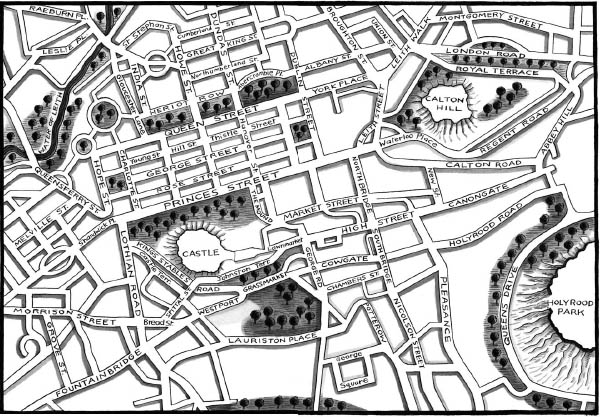Black And Blue (59 page)
Authors: Ian Rankin

The Oxford Bar – Rebus and many of the characters who appear in the novels are regulars of the Ox – as is Ian Rankin himself. The pub is now synonymous with the Rebus novels to the extent that one of the regular medical examiners called in to assist with investigations is named after the pub’s owner, John Gates
.

Edinburgh plays an important role throughout the Rebus novels; a character itself, as brooding and as volatile as Rebus. The Edinburgh depicted in the novels is far short of the beautiful city that tourists in their thousands flood to visit. Hidden behind the historic buildings and elegant façades is the world that Rebus inhabits
.
How does Ian Rankin reveal himself as an author interested in using fiction to ‘tell the truths the real world can’t’?

There are similarities between the lives of the author and his protagonist – for instance, both Ian Rankin and Rebus were born in Fife, lost their mothers at an early age, have children with physical problems – so is it useful therefore to think of John Rebus and Ian Rankin as each other’s alter egos?

Could it be said that Rebus is trying to make sense in a general way of the world around him, or is he seeking answers to the ‘big questions’? And is it relevant therefore that he is a believer in God and comes from a Scottish Presbyterian background? Would Rebus see confession in both the religious and the criminal sense as similar in any way?

How does Ian Rankin explore notions of Edinburgh as a character in its own right? In what way does he contrast the glossy public and seedy private faces of the city with the public and private faces of those Rebus meets?

How does Ian Rankin use musical sources – the Elvis references in
The Black Book
, for instance, or the Rolling Stones allusions in
Let It Bleed
– as a means of character development through the series? What does Rebus’s own taste in music and books say about him as a person?

What do you think about Rebus as a character? If you have read several or more novels from the series, discuss how his character is developed.

If Rebus has a problem with notions of ‘pecking order’ and the idea of authority generally, what does it say about him that he chose careers in hierarchical institutions such as the Army and then the police?

How does Rebus relate to women: as lovers, flirtations, family members and colleagues?

Do the flashes of gallows humour as often shown by the pathologists but sometimes also in Rebus’s own comments increase or dissipate narrative tension? Does Rebus use black comedy for the same reasons the pathologists do?

Do Rebus’s personal vulnerabilities make him understanding of the frailties of others?

How does the characterisation of Rebus compare to other long-standing popular detectives from British authors such as Holmes, Poirot, Morse or Dalgleish? And are there more similarities or differences between them?

